|
On October 13th, 2020,the Chinese Embassy in India jointly held an online symposium with Dr. Kotnis Acupuncture Health and Education Center in commemoration of the 110th birth anniversary of Dr. Dwarkanath Kotnis. Ambassador Sun Weidong attended the event and delivered the keynote speech titled "A Hero to Remember, A Monument to Eternity". Shri Kant Kotnis, cousin of Dr. Kotnis, Dr. Sumangala Borkar, niece of Dr. Kotnis, Dr. Inderjit Singh, Director of Dr. Kotnis Acupuncture Health and Education Center, Mr. Rajendra Jadhav, Chairman of Dr. Kotnis Memorial Committee in Mumbai, Mr. V Bhaskran, General Secretary of the Karnataka India-China Friendship Association (ICFA), Prof. Deepak, Director of Center of Chinese and Southeast Asian Studies at Jawaharlal Nehru University and other Indian representatives participated in the online symposium. Madam Lin Yi, Vice President of Chinese People's Association for Friendship with Foreign Countries (CPAFFC), Mr. Wang Lizhong, Director General of the Foreign Affairs Office of Hebei Province, Mr. Kang Mengwei, Political Commissar of Bethune International Peace Hospital, Mr. Zhang Wansheng, Party Secretary of the Second Affiliated Hospital of Hebei Medical University (Kedihua China-India Friendship Hospital), Ms. Ma Jia, Minister and Mr. Zhang Jianxin, Counselor of the Chinese Embassy also attended the event.
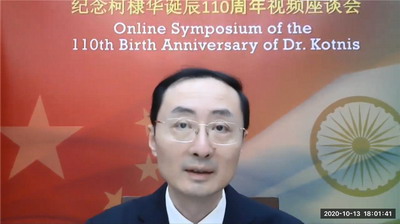
Ambassador Sun Weidong reviewed the life of Dr. Kotnis and pointed out that Dr. Kotnis is an outstanding representative of the Indian people and a monument to China-India friendship. He gave his precious life for the World Anti-Fascist War and the cause of China-India friendship. We will always remember him. The Chinese people were deeply saddened by the loss of Dr. Kotnis. Chairman Mao Zedong personally wrote the condolence couplet: "An Indian friend, Dr. Dwarkanath Kotnis came to China to assist the War of Resistance against Japanese Aggression. He worked in Yan'an and North China for five years, treated the wounded. He died of fatigue and illness. The whole army has lost a helping hand and the nation has lost a friend. The internationalism of Dr. Kotnis shall never be forgotten."
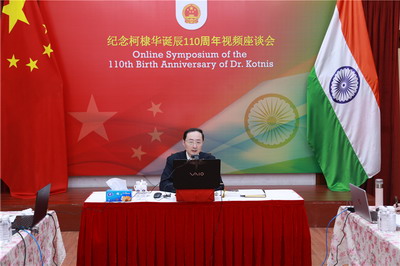
Ambassador Sun said that after the founding of the People's Republic of China, successive party and state leaders of China met and consoled the relatives of Dr. Kotnis during their visits to India. On September 19, 2014, President Xi Jinping met in New Delhi with Manorama Kotnis, the younger sister of Dr. Kotnis, and conferred on her the Five Principles of Peaceful Coexistence Friendship Award in recognition of the long-term commitment of Dr. Kotnis' family to the cause of China-India friendship. On September 3 this year, President Xi Jinping delivered an important speech at the symposium to commemorate the 75th anniversary of the victory of the Chinese People's War of Resistance against Japanese Aggression and the World Anti-fascist war. President Xi said that the Chinese people will never forget the precious assistance and support provided by various anti-fascist forces such as peace-loving and justice-loving countries and people, international organizations in the Chinese People's War of Resistance against Japanese aggression. Canadian doctor Norman Bethune and Indian doctor Kotnis came to China from thousands of miles away to save lives. Their touching stories and noble character will always be remembered in the hearts of the Chinese people!
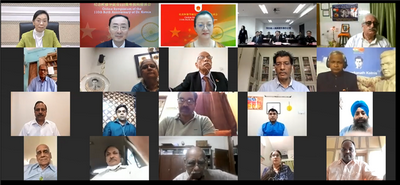
Ambassador Sun said that Dr. Kotnis is exemplary of the noble character and great spirit of mankind. It is a spirit of humanitarianism for rescuing the dying and healing the wounded. He worked nearly 20 hours a day under extremely difficult conditions and in extreme shortage of medicines. In 1941, he personally performed more than 450 surgeries, pulling countless people back from death. It is a spirit of heroism with no fear of sacrifice. Regardless of his safety, he voluntarily demanded to go to the front line. He risked his life to cross the enemy's blockade many times and insisted on bringing the operating table to the front line, leaving his own life and death behind. It is a noble spirit of internationalism. With a strong sense of justice against oppression, he selflessly supported the liberation of the Chinese people, and devoted himself to the War of Resistance against Japanese Aggression. He became a symbol of the two great nations joining hands to resist foreign aggression and colonial rule, and pursue national independence and freedom.
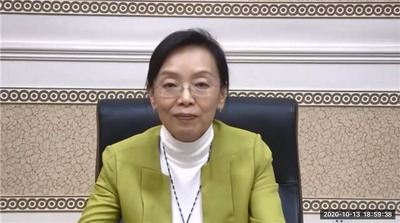
Ambassador Sun emphasized that we are commemorating Dr. Kotnis to not only honor his deeds, but also carry forward his spirit and promote the cause of China-India friendship. Over 70 years ago, China and India helped and supported each other in the struggle for national liberation and independence and forged deep friendship. Today, the two countries are facing the common task of achieving economic and social development and improving people's livelihood. We need to enhance mutual trust and strengthen cooperation more than ever to write a new chapter for China-India friendship. The bilateral relations have recently encountered some difficulties and challenges. As two major neighboring countries, it is normal to have differences. We need to put differences in an appropriate place in bilateral relations, properly manage and resolve them through dialogue and consultation and not allow differences to become disputes.
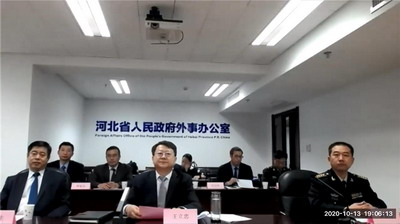
Ambassador Sun reiterated that at present all countries in the world are faced with severe challenges posed by COVID-19. No one is immune to this public health crisis. As the only two major developing countries with a population of over 1 billion, China and India need to strengthen cooperation and tide over current difficulties together. It is of great significance in the global fight against the pandemic. This year marks the 70th anniversary of the establishment of diplomatic relations between China and India and the "Year of China-India Cultural and People-to-People Exchange". We should build on the legacy of Dr. Kotnis, follow the guidance of the important consensus reached by our leaders, act in line with the trend of the times, enhance mutual trust, advance practical cooperation in all fields and constantly inject positive energy into China-India relations.
The atmosphere of the symposium was cordial and warm. The participants cherished the memory of Dr. Kotnis in various way. Mr. Kant Kotnis, at the age of 97, greeted the participants in Chinese. Dr. Borkar emotionally recalled the care for her family from the CPC and Chinese government leaders over the years and thanked the Chinese people for always remembering Dr. Kotnis. Dr. Inderjit Singh said that martyrs such as Dr. Kotnis and Dr. Basu were pioneers not only in the cause of China-India friendship, but also brought the Chinese acupuncture to India benefiting the Indian people and keeping the spirit of Dr. Kotnis to be passed on in India. Mr. Bhaskaran said that Dr. Kotnis is a flag of the cause of China-India friendship that never fades, and India-China Friendship Association will strive to be a pioneer in inheriting and carrying forward the spirit of Dr. Kotnis. Madam Lin Yi introduced the work of the CPAFFC in carrying forward the spirit of Dr. Kotnis and promoting the cause of China-India friendship, and expressed that CPAFFC will deepen the cooperation and communication with Indian friendship organizations. Mr. Wang Lizhong, Mr. Kang Mengwei and Mr. Zhang Wansheng and other participants committed that they will guard the spiritual monument of China-India friendship, carry forward Dr. Kotnis' spirit and promote the cause of China-India friendship with the Dr. Kotnis Memorial Hall and the China-India Friendship Hospital as the base. Prof. Deepak recalled the touching story of translating the biography of Mrs. Guo Qinglan, spouse of Dr. Kotnis, and talked about his thoughts on carrying forward the spirit of Dr. Kotnis.
The participants expressed that Dr. Kotnis is a symbol of China-India friendship. He sacrificed his life for upholding peace and justice. The spirit of Dr. Kotnis is of great significance for promoting China-India relations. As ancient civilizations of the East, both China and India advocate harmony and peace-loving with the cultural genes of seeking common ground while reserving differences. The two sides should better understand each other, support and learn from each other, and promote common development to forge the Asian Century. We should believe that the governments and peoples of the two countries have the wisdom and capability to properly handle differences and resolve problems for better benefit of 2.7 billion people. At present, human beings are facing the challenges of COVID-19 and unilateralism. It needs the spirit of Dr. Kotnis more than ever. Dr. Kotnis devoted his life for the benefit of the world. This fearless spirit of internationalism is the right way to address the current international public health crisis.
During interaction with participants, Ambassador Sun reiterated that, first, the Chinese is a grateful nation. The Chinese people will never forget the help extended by the righteous people from all over the world in China's struggle against aggression, and the contribution made by the Indian Medical Mission Team. There were only five members in the Indian medical team to China, and now tens of thousands of people are carrying the torch of China-India friendship. Second, the novel coronavirus is the common enemy of mankind. Only through cooperation can countries win the battle against the pandemic. As the world's largest developing countries, China and India need to join hands in fighting against the pandemic and overcoming the difficulties, which is of great significance to the world in defeating the COVID-19 and building a community with a shared future for mankind. Third, the inheritance of the spirit of Dr. Kotnis rests on young people. We must build on the spirit of Dr. Kotnis and continue to deepen the people-to-people and cultural exchanges between the two countries, particularly youth exchanges, to make the China-India friendship evergreen like a pine tree.
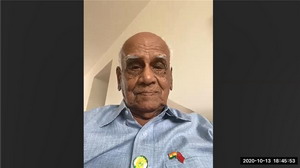 |
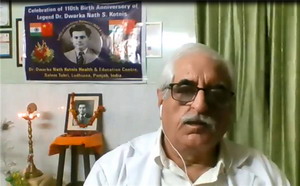 |
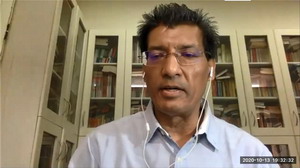 |
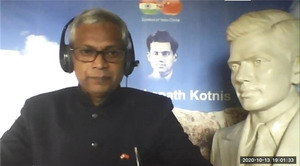 |
|